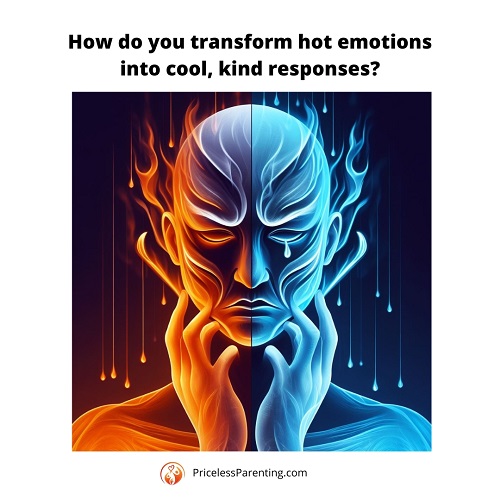Hot Emotions, Cool Responses
by Kathy Slattengren, M. Ed., Priceless Parenting (sign up for monthly parenting newsletter and receive 20+ printable charts for kids and parents)

When was the last time you felt angry when interacting with your children? If you’re like most parents, it was recently! Your children are especially talented at helping you get in touch with your anger.
One key rule of parenting is to never physically harm your child. To do this you absolutely must be able to control your behavior when your emotions are boiling. You need to be aware that you are upset and know what works for you to calm down.
Even babies can innocently trigger anger in their parents. Parents who lack the skills to calm themselves down have shaken their babies causing serious, permanent brain damage. Bryce is one example of a boy who was born healthy and then sustained traumatic brain injury from his father shaking him. You can
see the impact on Bryce in this interview with his adoptive parents.
Calming Down
All your emotions are valid and provide important information. However, to receive the insight, you must first be able to think clearly. When you are in the heat of anger or frustration, your ability to think is compromised. You must first calm down before you’ll be able to access your best thinking.
You will do your worst parenting if you decide to act while your emotions are hot. Instead of doing something, make sure your child is in a safe place and take time out for yourself. If you have a baby, that means putting the baby down in a safe place like a crib and walking away. If your children are older, you can send them to their rooms while you retreat to a different area. If you are driving, that may mean pulling over and getting out of the car while the kids stay in the car.
Once you’ve had a chance to settle down, you will be able to see more options for handling the situation. You’ll be able to tap into a response that honors the love you have for your children while also setting a limit on their behavior.
Engaging Your Best Thinking
When strong negative emotions take hold, you feel separate from your children. You get into a “me versus them” mindset. You want to force them to behave the way you want them to behave. You want them to regret whatever it is they did.
Tara Brach, a Clinical Psychologist specializing in mindfulness, calls this the “trance of separation”. Brach writes
“When we get stuck in difficult emotions like hatred, anger and fear, we are in a trance of separation – disconnected from the whole of our inner experience, each other and the web of life.”
Brach discusses four inquiries that help reconnect you with your heart when you are experiencing difficult emotions. You need to pause in order connect with your wise self and come up with your best response. It starts with remembering your highest aspirations for your relationship with your child. It continues with figuring out what is going on within you that has triggered your strong emotions. It ends with calling forward your caring, loving self and determining your response from that place.
Aspiration (your goal)
- What is most important right now?
- What most matters to me?
Truth (your experience of this present moment)
- What is true here?
- What is happening inside me right now?
Kindness (your desire to act from love not hate)
- How can I meet what is happening with kindness?
- How can I awaken my love for my child?
Action (your response)
- What is love asking from me?
- What is my highest response to this situation?
Answering these questions will help you shift from focusing on yourself to focusing on both you and your child. Once you give yourself more space, you’ll be able to access your wiser self. You’ll uncover ways to set limits on your child’s behavior without hitting, shoving, name calling or worse.
Choosing Your Response
This does not mean you let your child get away with bad behavior. It means that you address the situation in a way that is respectful to both you and your child. If you are struggling to figure out how to best set a limit with your child, you can also talk to a friend or mentor for ideas.
Taking a
parenting class can also provide many ideas for responding to misbehavior.
Your relationship with your child is far bigger than this current conflict. Looking back at this situation a month from now, what will matter most about how you reacted in this situation? By slowing down and calming down, you are more likely to act in ways that are in alignment with your best self. Following this process will lead to fewer regrets and more repairs in your relationship with your child. You will also be teaching your child how to turn hot emotions into cool, kind responses.